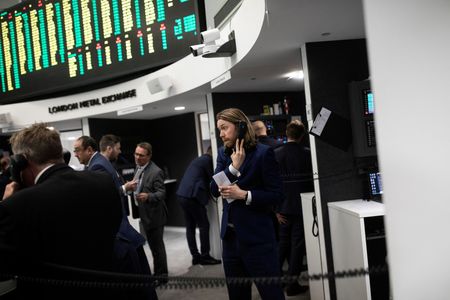 1
1 1
1

By Eric Onstad
LONDON (Reuters) – Despite the turbulent, stop-start trading of nickel on the London Metal Exchange, frustrated investors who may want to shift their business elsewhere have found there are no quick and easy alternatives.
The 145-year-old institution suspended activity and cancelled trades last week due to volatility that saw prices double to above $100,000 a tonne within hours. A spate of technical glitches after trading resumed this week has left traders fuming.
Amid the chaos, some pointed to the Shanghai Futures Exchange (ShFE), where there have been few such interruptions to nickel trading, as a defacto benchmark.
But a lot would have to change for ShFE to set global reference prices.
Trading on ShFE is difficult for non-Chinese, who need an affiliation with a Chinese entity. Then there are differences in currency and language and adjustments for duty and VAT, traders said.
Shanghai also has a lot of small-scale retail speculators, whereas the LME is dominated by financial institutions, producers and industrial users.
“I don’t think there’s a quick fix. It’s a real problem,” said Tom Price, head of commodities strategy at Liberum.
“In the longer term the LME seems to be in lots of trouble.”
The LME benchmark nickel contract slumped to $41,945 a tonne on Thursday, hitting its daily limit for the second day in a row.
Traders said it would probably continue to slide until it reached parity with the price of the metal in China at about $34,300 a tonne.
However, European industrial users were not flocking to Shanghai, one trader at a LME ring-dealing member said.
“I don’t see any physical players pricing on ShFE, even the Chinese themselves, but longer term, the LME has to get its house in order,” he said.
The LME called last week’s situation “unprecedented”.
“However, we fully recognise that we must consider taking action in order to prevent such a situation from happening again,” a spokesperson said. “We will consider carefully any appropriate future steps we could take to further build market resilience.”
ShFE was not immediately available for comment.
Price said that until orderly trading of the LME nickel contract resumes, some local physical buyers may need to somehow peg their business to exchange prices reported before the disruption.
CHINA PRICING POWER
In the longer term, China as the world’s biggest consumer and producer of many commodities, wants to take a greater role in establishing global prices.
“The nickel futures incident highlights the importance and urgency of promoting internationalisation of relevant nonferrous metal futures,” said Duan Shaofu, an official from the China Nonferrous Metals Industry Association.
Establishing Chinese-based international base metals contracts would reinforce China’s commodity pricing power, he added in an article posted on the group’s website on Thursday.
New international contracts may follow the lead of a copper futures contract that is open to foreign traders, launched in 2020 on the Shanghai International Energy Exchange (INE). https://reut.rs/3D4xbuF
CME OPPORTUNITY?
Another possibility is the CME Group Inc launching a nickel contract alongside its successful copper futures.
The CME declined to comment.
Although it has rolled out contracts in aluminium, zinc and lead, they have so far failed to gain momentum.
Copper performs strongly on the CME because its contract, with a traditional monthly settlement date, is easy for hedge funds and speculators who often use the metal as a proxy for the global economy.
Complex LME contracts, in contrast, allow trading any single day for the first three months, set up to allow miners and industrial consumers to hedge physical shipments for odd periods.
The physical basis of the LME, which is owned by Hong Kong Exchanges and Clearing Ltd., will make it difficult to dislodge the exchange from setting global benchmarks, despite the current ructions.
“I don’t think the LME is going to be replaced easily,” said a Chinese industry source in London. “I know a lot of people are disappointed and angry, but I think there’s still a strong rationale for the LME.”
(Additional reporting by Min Zhang in Beijing; Editing by Veronica Brown and Kirsten Donovan)